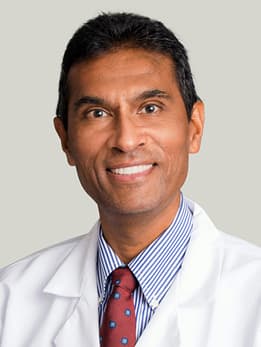Woman with rare autoimmune disorder receives bloodless heart transplant
Patient Receives Bloodless Heart Transplant
[MUSIC PLAYING] I was a very healthy 47-year-old that was very active. I was active in my ministry. I enjoyed outdoor activity. And I would come to and drop out and come to. So they came again and got me. And yeah, that's when it got really scary.
So due to my faith, I don't take blood transfusions. So they weren't willing to – they weren't able to work to do that for me.
The University of Chicago was actually on a list that we have that would accept ones like Lisa to do bloodless surgery. And so we contacted the hospital liaison committee up here. And it just so happens that they worked closely with Dr. Jeevanandam.
Just so, I mean, really comforting. He was willing to do what I needed is – and respect my faith.
I think the biggest thing is they were just open and honest with me. They would tell me, this is what's happening.
And, you know, we just became part of the hospital, so to speak. You know, the group and the nurses would come by, and they knew us by name, and they talked to us. So I think that was the biggest thing, is they treated us like family.
Each month that goes by, I just stay very active, walk a lot. And you just get stronger and stronger. But what I'm looking forward to about being home is being with my family and getting to be with my son – for about a month before he gets married in May. So I'm thankful that I'll be there.
In 2018, Lisa Whitley was a healthy, 47-year-old wife and mother living outside of Nashville, leading an active life through her ministry and outdoor activities, when she suddenly began to feel very tired and weak.
Whitley was diagnosed with giant cell myocarditis, an autoimmune disorder that affects the heart muscle, and she was told she needed a heart transplant. As one of Jehovah’s Witnesses, she desired treatment without the use of blood transfusions. Whitley’s home hospital was unable to offer her a bloodless heart transplant, so Whitley and her husband, Robert, sought treatment elsewhere. They reached out to their Jehovah’s Witness community for guidance.
"The University of Chicago was actually on a list that would accept ones like Lisa to do bloodless surgery," said Robert. "So we contacted our hospital liaison committee here, and it just so happens that they worked closely with Dr. Jeevanandam."
Valluvan Jeevanandam, MD, is a world-renowned heart surgeon who has received national attention for his skill in performing bloodless cardiac surgeries. These operations require the use of precise surgical techniques to minimize blood loss during the procedure — sparing the need for a blood transfusion. UChicago Medicine is one of the few hospitals in the country that perform blood-free heart transplants and ventricular assist device surgeries.
"It was just so, really, comforting. He was willing to do what I needed and respect my faith," said Whitley.
Whitley's care team supported her through a long recovery. "We just became part of the hospital, so to speak," said Robert. "They knew us by name, and they talked to us. So I think that was the biggest thing; they treated us like family."
But it was also her real family that kept her going. "Each month that goes by, I just stay very active, walk a lot. And you just get stronger and stronger," said Whitley. "But what I'm looking forward to about being home is being with my family and getting to be with my son."

Valluvan Jeevanandam, MD
Dr. Valluvan Jeevanandam specializes in the surgical management of heart failure, and is an expert in high-risk cardiac surgery. He has performed more than 1,000 heart transplants — including the total artificial heart — and countless cardiac surgery procedures.
Learn more about Dr. Jeevanandam
Bloodless Heart Surgery
UChicago Medicine’s Bloodless Heart Surgery Program performs bloodless heart surgery (or transfusion-free heart surgery) on even the most complex bloodless heart surgeries without compromising our patients’ religious or personal reasons for needing “no blood” surgical or medical treatment. the most complex bloodless heart surgeries.
Learn more about bloodless heart surgery.